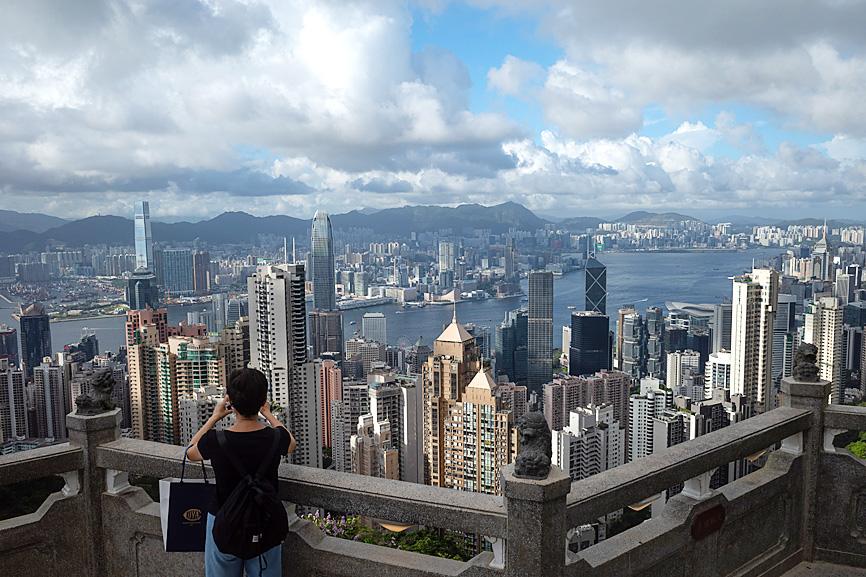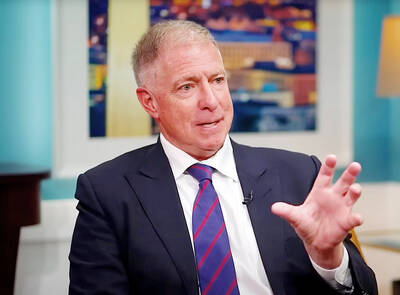Hong Kong’s National Security Law has had a “chilling effect” on the territory in the year since its passage, with more than 60 percent of Hong Kongers expressing doubts about their future, the Mainland Affairs Council said on Tuesday.
The broad rules have left few segments of Hong Kong society untouched since becoming law in June last year, the council said in a report marking the 24th anniversary of the territory’s handover to China.
The US-based Freedom House in March gave Hong Kong the worst rating in the history of its Freedom in the World report at 52 points, ranking “partly free,” due mainly to the security legislation, the report said.

Photo: EPA-EFE
Germany’s Global Public Policy Institute and Reporters Without Borders similarly downgraded the territory in their respective reports on academic and press freedom, it added.
Although relatively few people have been arrested under the security legislation, the scope of those prosecuted for speech from prior to the law’s passage — from politicians to academics and journalists — has produced a “chilling effect,” the council’s report said.
The press especially is facing “unprecedented political violence,” including with the redefinition of “media representative” to only recognize workers of media outlets registered with the government, it said.
Next Digital has emerged as a victim of the security legislation, as police have used it to prosecute owner Jimmy Lai (黎智英) and Apple Daily executives, it said.
The closure of the Apple Daily on June 25, shortly after the government froze its assets, has “sounded a death knell for press freedom in Hong Kong,” it said.
Many news firms have chosen to stay silent, leading to the closure or removal of content from online publications such as Stand News, Winandmac Media and Post 852, the council said in the report.
Meanwhile, increasing numbers of academics critical of Beijing have been dismissed or forced out since last year, it said.
Some have even seen their teaching qualifications revoked for disseminating content in support of independence, it added.
Changes to the education curriculum in February also outlawed political activities on campuses and banned teachers from discussing their political views, while mandating education about the security law to more than 8,000 students, it said.
Fear over reporting by students is likely to deepen self-censorship on campuses, the council said, adding that some academics are also considering cutting back on international exchanges.
Censorship has even extended to the Internet and the arts, drawing an ambiguous red line that would stifle creative freedom, it added.
The Web site HKChronicles, which publishes personal information of police officers and pro-Beijing figures, was reportedly shuttered by Hong Kong security forces with cooperation from Internet service providers, the council said.
Pro-China media have also criticized the Hong Kong Arts Development Council for funding “reactionary” works of art and the M+ museum for exhibiting works by Ai Weiwei (艾未未), it added.
Changes announced last month to the Film Censorship Ordinance would ban films that “endanger national security,” it said.
Public gatherings have also been halted, including the annual Tiananmen Square Massacre candlelight vigil that had been held every year for three decades, it said.
Even freedom of movement could be affected, as the passage in April of changes to immigration regulations would grant authorities the power to bar individuals from entering or leaving the territory when it goes into effect on Aug. 1, the council added.

The Grand Hotel Taipei on Saturday confirmed that its information system had been illegally accessed and expressed its deepest apologies for the concern it has caused its customers, adding that the issue is being investigated by the Ministry of Justice Investigation Bureau. The hotel said that on Tuesday last week, it had discovered an external illegal intrusion into its information system. An initial digital forensic investigation confirmed that parts of the system had been accessed, it said, adding that the possibility that some customer data were stolen and leaked could not be ruled out. The actual scope and content of the affected data

A New York-based NGO has launched a global initiative to rename the nation’s overseas missions, most of which operate under the name "Taipei," to "Taiwan Representative Office (TRO)," according to a news release. Ming Chiang (江明信), CEO of Hello Taiwan, announced the campaign at a news conference in Berlin on Monday, coinciding with the World Forum held from Monday through Wednesday, the institution stated in the release. Speaking at the event, Democratic Progressive Party Legislator Huang Jie (黃捷) said she believed this renaming campaign would enable the international community to see Taiwan

DEFENSE: The US should cancel the US visas or green cards of relatives of KMT and TPP lawmakers who have been blocking the budget, Grant Newsham said A retired US Marine Corps officer has suggested canceling the US green cards and visas of relatives of opposition Taiwanese lawmakers who have been stalling the review of a proposed NT$1.25 trillion (US$39.7 billion) special defense budget. The Executive Yuan has proposed the budget for major weapons purchases over eight years, from this year to 2033. However, opposition lawmakers have refused to review the proposal, demanding that President William Lai (賴清德) first appear before the Legislative Yuan to answer questions about the proposed budget. On Thursday last week, 37 bipartisan US lawmakers sent a letter to Legislative Speaker Han Kuo-yu (韓國瑜), the heads

DO THEY BITE IT? Cats have better memories than people might think, but their motivation is based entirely around the chance of getting fed Cats can remember the identity of the people who fed them the day before, Taipei-based veterinarians said on Friday, debunking a popular myth that cats have a short memory. If a stray does not recognize the person who fed them the previous day, it is likely because they are not carrying food and the cat has no reason to recognize them, said Wu Chou Animal Hospital head Chen Chen-huan (陳震寰). “When cats come to a human bearing food, it is coming for the food, not the person,” he said. “The food is the key.” Since the cat’s attention is on the food, it